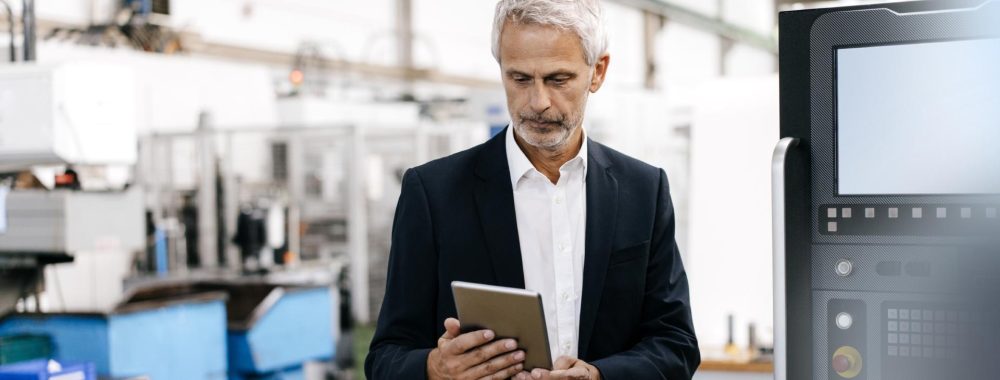The tremendous power of technology is transforming everything. Today, digitization is hitting the industrial sphere full force, reshaping and reinventing product after product, company after company, industry after industry.
Smart Industry is not just a concept, it is an approach that is here to stay and in this article we will tell you why.
IT and OT convergence
Just as the modern car illustrates how digitization is transforming the physical things around us, it also illustrates the evolving skill set needed to develop these products.
An integration is taking place: information technology and operational technology are coming together. Although mechanics and hardware remain indispensable, the demand for solutions that incorporate artificial intelligence, data analytics, digital twins, security by design, cloud, edge computing, etc., is increasing.
Software is becoming increasingly important in product development, not just in industries like the automotive industry, but in any industry that wants to compete in today’s marketplace.
Smart industrial production
Digital transformation is not just reinventing industrial products. Industrial processes are also changing. Plants and production lines connect and communicate, enabling more efficient supply chains and logistics, predictive maintenance, intelligent services, and strategic decision-making vital to competing.
To produce goods more efficiently and sustainably and enable rapid adjustment to customer demands, the Smart Industry comprises a host of technologies, such as robotics, augmented reality, and digital twins.
The systems are deeply integrated with each other, and real-time data from every part of every production line can be accessed from virtually anywhere. The factory also connects to external systems, while being heavily protected by cyber defense mechanisms.
In short: digital transformation has arrived at the factory gate, taking the mega-trend of industrial automation to a whole new level.
Smart Industry, why it is so powerful
1. Smart Industry, take advantage of technology to produce intelligently
A company focused on Smart Industry works to understand its customers, adapting its production to what the market demands. To do this, it goes through profound changes in its way of understanding production and the business model, as well as the ways of executing the work. The world has changed and the way of doing business too. It is important to understand that trends are not set by companies but by customers, who decide based on their needs and tastes.
2. In a Smart Industry, people and technology go hand in hand
A new way of understanding automation projects is needed, a new way of creating a more fluid relationship between people and machines.
Adopting technology without considering the human element is one of the biggest risks that can be committed. We are witnessing a new era in which machines and technology have evolved from being able to perform physical tasks faster and more efficiently than humans, to activities that involve cognitive abilities and require a certain level of intelligence.
Human tasks as we know them today are being transformed, giving way to machines that can do the job more efficiently and cheaply. But experience shows that its true potential requires people and technology to work in concert.
3. The Smart Industry shares information openly
One way to fail in the objective of achieving an intelligent industry is to keep the departments or areas of the company tight and not think that the information of one department can be very useful for the rest. Outdated processes and a lack of integration between designers, developers, and manufacturers greatly limit innovation and the quality of products and services.
Flexibility and management progress are achieved by sharing information between the different departments of the company. Some industrial companies tend to have hermetic departments with little shared information. We come from the type of work where misinformation is unfortunately power for many, when the reality is that the only power should reside in information.
A Smart Industry must be able to transform information into knowledge to establish better strategies and broaden its horizon.
4. Being a Smart Industry means being socially and environmentally responsible
There is no doubt that it is a mistake to focus only on economic interests. Businesses must also meet their social and environmental responsibilities. The company cannot and should not forget its relationship with society and must be as responsible as possible. Forgetting this promise and not using technology for sustainable growth is guaranteed to fail in the future, as society demands to be sustainable with the planet and have a strong social conscience.
5. A Smart Industry uses technology to innovate, predict and be proactive
The world is peripheral and it spins faster and faster. It develops at a rate of geometric progression that our brains cannot comprehend.
Ignoring what is happening around you, not anticipating, not being proactive, not innovating and being afraid of failure will inevitably lead to failure. Innovation must be a fundamental, dynamic part that meets customer expectations.
Focus your business towards a true Smart Industry with Nexus Integra
At Nexus Integra we are committed to digital transformation with the aim of a more efficient, sustainable and intelligent industrial future.
Nexus Integra offers a single operations center that allows you to control, monitor and manage all facilities, assets and production plants, in a simple, fast and autonomous way. Thus, it becomes a powerful tool to achieve industrial digital transformation to achieve a true Smart Industry.
Contact our team of professionals for a tailor-made solution.


